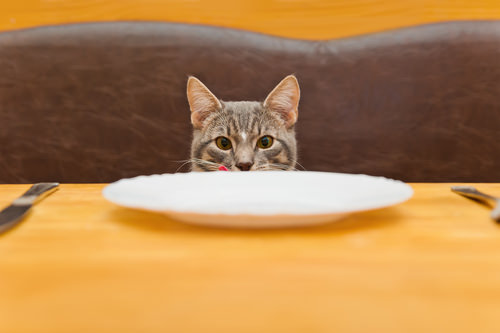
Nutrition is vitally important to the health, happiness and longevity of your cat. The old adage “You are what you eat” definitely applies to your cat. Cats have unique requirements from their diets because they are obligate carnivores. This means that their bodies are unable to produce certain things that they need to survive and they are completely dependent on their diet as a source of them.
When choosing a pet food, be sure that you read the label. Any product that is not labeled “complete and balanced” for your cat’s life stage should be avoided. Labels can be misleading and should not be taken at face value in every case. Buzzwords like “holistic” or “natural” mean very little and are designed to sell pet food. The best pet food companies spend their money on scientific development and not advertising. Be aware that reading the label is not all you should do to be sure it is a good choice.
Commercial pet foods are held to basic standards, but you want more for your cat than the minimum. You want to be sure that your choice is not the minimum to meet the guidelines and nothing more. How can you tell?
Choose a brand that had a phone number to the manufacturer included on the packaging. Contact them or have us call them. Excellent questions might include:
- Who formulates your diet? A veterinary nutritionist should formulate pet foods. Remember, big name celebrities are not pet food experts.
- Do you have a veterinary nutritionist on staff who can answer questions? If not, this is not the food for your cat.
- Where is your diet manufactured? Pet foods made in the US with US ingredients are preferable. Facilities should be open to tours.
- How do you insure quality, purity and compliance with AAFCO requirements? AAFCO is the American Association of Feed Control Officials and there are 2 ways to meet their requirements, nutrient analysis and feeding trial. Feeding trial testing is more expensive and time consuming for manufacturers, but is much better for knowing if a diet is truly high quality for live pets.
- What is the calorie content of a cup of your diet? To maintain your pet’s healthiest body condition, you will need to get a calorie guideline from your vet. You will need to know how many calories are present in your pet’s food to best comply.
- Has your product been researched? Are the findings published? Research and publication are also time consuming and costly. Only manufacturers who want the best quality are willing to invest in the research and only the most valuable findings are published.
Being a knowledgeable consumer helps insure that you are getting what you think you are paying for. Do not be misled by attractive packaging and catchy commercials. Choose a pet food that puts your cat’s health first and is willing to prove it.
*These guidelines have been published by the World Small Animal Veterinary Association.

